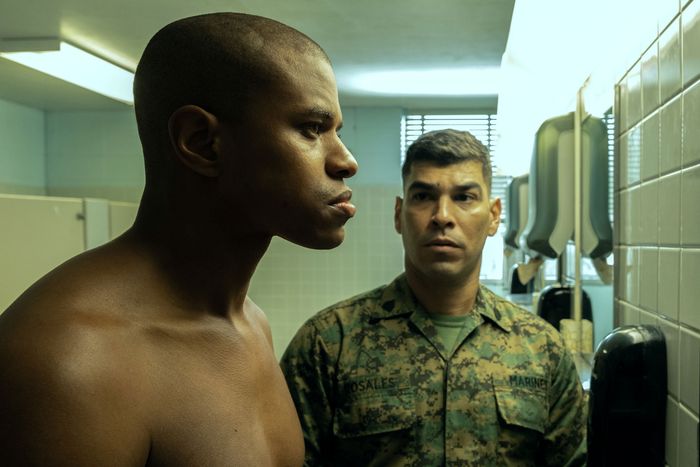
Have the rhythms of basic training stayed the same over the years, or is that just how they’re depicted on screen? Watching Elegance Bratton’s The Inspection, a film that follows a young gay Black man named Ellis French (Jeremy Pope) through Marine boot camp, you might start to wonder if film and reality formed a feedback loop, the way that reality-show participants started casting themselves as particular archetypes. Laws (a magnetically loathsome Bokeem Woodbine), the drill sergeant who becomes Ellis’s lead, though not only, abuser, is so clearly of the R. Lee Ermey and Louis Gossett Jr. school that he’d seem like a cliché if one scene didn’t show him off the clock. Relaxing in the back room with other officers, including the considerably more sympathetic Rosales (Raúl Castillo), Laws lets the hardass façade drop and reveals what’s beneath it, which is mostly just relieved amusement that he hasn’t been reported for hazing yet. His homophobia is real, and shared by many of the other recruits, but his tendencies also owe something to the organization he’s a part of. He can get away with almost killing Ellis in a swimming exercise because torment is what everyone signed up for. They all know how this process is supposed to go.
The Inspection is Bratton’s first scripted feature — he made his debut with the 2019 documentary Pier Kids, about homeless trans and queer youths carving out a precarious community for themselves in New York. It’s a situation he’s personally familiar with. His new film is autobiographical, and opens with Ellis living in a shelter, having been kicked to the streets years ago by a mother (Gabrielle Union) who’d rather have no son than a gay son. As Inez, an unyielding correctional officer whose apartment is papered with religious iconography, Union is superbly brittle, and underused — there are times when the memories the film draws from appear to be too raw to fully reckon with, especially in the scenes with Inez that bookend the main action. The Inspection feels as incomplete as it does full of promise, unwilling to interweave glimpses of Ellis’s home life with his time in basic, even though that is the unspoken comparison it lays out. Inez’s refusal to allow even a hint of softness in her first scene is breathtaking. Offering Ellis the birth certificate he needs to enlist, she tells him, “This little piece of paper is all I have left of the dream I held for you.” Then she tells him to consider it void if he doesn’t “come back the son I gave birth to.”
Inez’s love may be conditional, but then so is that of the United States Armed Forces, which are in the era of “Don’t ask, don’t tell” and are willing to take a queer kid in, so long as he shuts up about his sexuality. The Inspection isn’t pro-military; it has little interest in romanticization, patriotism, or combat, and it’s frank about the dehumanizing aspects of its training process and who gets targeted the most. But it’s also heartbreakingly open about the bargain Ellis, who’s quickly outed, is making. He will endure taunting, ostracism, and hazing that at one point comes close to killing him. In exchange, he will finally be claimed by something, if not a parent. Despite what his mother implies, he doesn’t join in hopes that the Marine Corps will somehow make him straight — he’s at peace with his sexuality to the point where he notices, as many have before, that any hypermasculine, homosocial environment is ripe with erotic potential. He joins for the stability it offers, as well as for a sense of belonging. When you come up equating love with pain, the forced bonding of basic training doesn’t look all that foreign.
Pope, a Broadway star who’s done turns on two Ryan Murphy series, has the easy beauty of a suffering saint. But the surprise of The Inspection is that it doesn’t want to paint Ellis as a martyr and that it actually gets lighter as it goes along rather than grimmer, finding room for lust and touches of humor. Bratton, who has an eye for compelling framing and unexpected beauty, has made something more complicated than a treatise against the power structures enshrined in the military, though he’s very aware of them. Ellis doesn’t intend to give up on his mother, despite her hatred of who he is, but in the film’s bittersweet finale, his new family steps up to defend him from his biological one. It’s a moment way too uneasy to be described as triumphant, which is what makes it so very interesting.
More Movie Reviews
- The Thriller Drop Is a Perfect Addition to the Bad-First-Date Canon
- The Accountant 2 Can Not Be Taken Seriously
- Another Simple Favor Is So Fun, Until It Gets So Dumb


